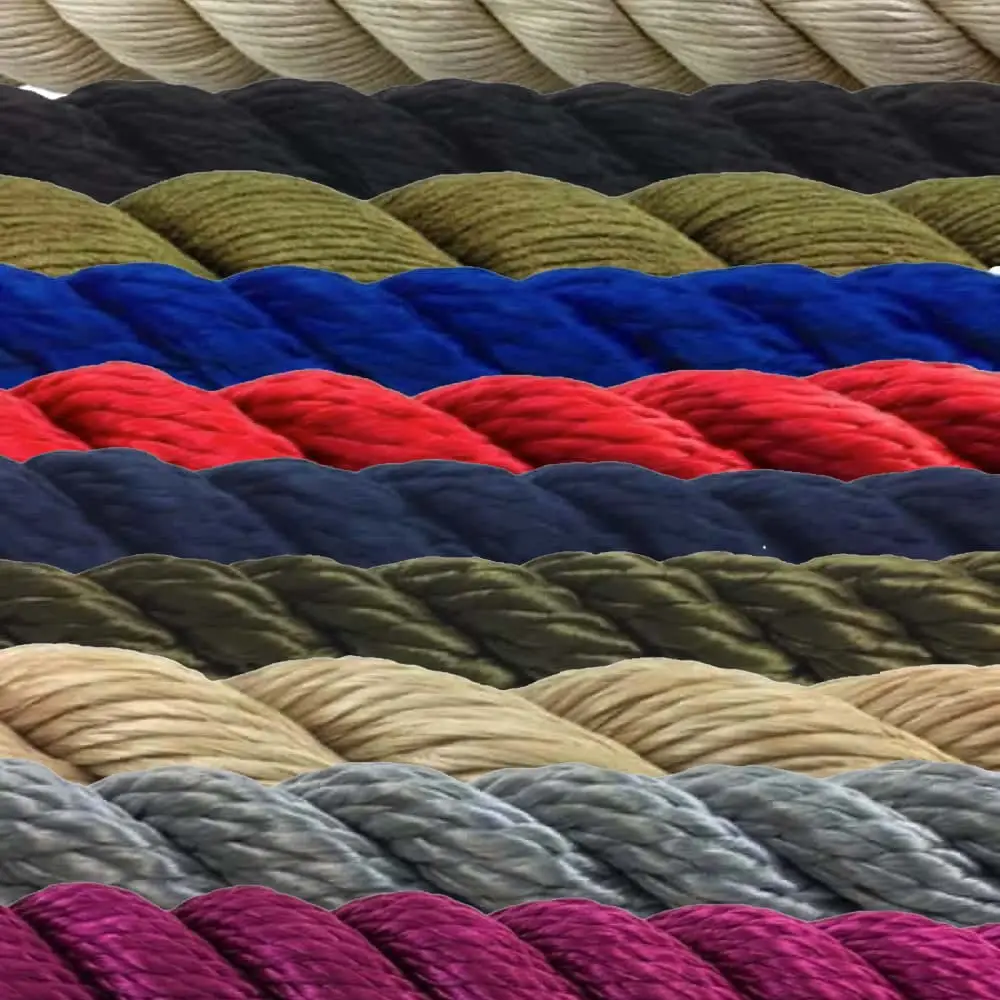Synthetic Decking Rope
£1.95
At RopeServices UK, our synthetic decking ropes provide a durable, long-lasting solution for outdoor projects. These ropes are designed to resist rot, UV damage, and general wear, making them ideal for decking, railings, fencing, and garden designs. With a wide selection of colours and textures, you can customise the look and feel of your project while benefiting from the superior performance of synthetic materials.
Types of Synthetic Decking Rope
Black Staplespun Rope
The black staplespun rope offers a sleek and modern finish that complements any outdoor design. Its tough, weather-resistant construction is ideal for securing railings, fencing, or creating a professional, polished appearance.
White Staplespun Rope
This bright and clean rope is perfect for modern garden designs. Its lightweight yet strong construction ensures durability and adds a fresh look to decking and borders.
Synthetic Royal Blue Rope
The vibrant royal blue rope stands out in any outdoor setting. Its bold colour, combined with excellent UV and weather resistance, makes it a great choice for nautical or decorative applications.
Synthetic Grey Rope
For a subtle, contemporary look, the synthetic grey rope blends effortlessly into modern decking projects. Its durability and UV stability make it suitable for functional and aesthetic applications alike.
Synthetic Manila Rope
This rope combines the traditional appearance of natural manila with synthetic durability. It resists rot and wear, making it perfect for outdoor projects with a classic, rustic style.
Synthetic Navy Rope
With a deep navy colour, this rope adds elegance to outdoor spaces. It’s durable and weather-resistant, making it suitable for nautical or traditional designs.
Synthetic Olive Rope
Earthy and understated, the olive rope blends beautifully with natural surroundings. Its durable design is ideal for landscaping and garden projects.
Synthetic Polyhemp Rope
Polyhemp rope mimics natural hemp’s appearance while offering superior durability. It’s rot-resistant and UV-stable, making it perfect for railings, fencing, and rustic designs.
Synthetic Red Rope
This bold red rope creates eye-catching accents in outdoor spaces. Its vivid colour and weather-resistant properties make it perfect for decorative borders or railings.
Synthetic Sisal Rope
Synthetic sisal offers the textured, rustic appearance of natural sisal with added durability. It’s ideal for outdoor applications that need a low-maintenance, natural look.
Synthetic White Cotton Rope
This rope mimics the soft, classic look of cotton while offering enhanced strength and weather resistance. It’s perfect for decorative applications in outdoor settings.
Synthetic Maroon Rope
The deep maroon rope provides a warm, distinctive look for decking and garden borders. Its UV resistance and durability ensure it retains its appearance over time.
Measuring Synthetic Decking Rope
We measure all synthetic ropes under tension using calibrated measuring clocks to ensure precise and consistent sizing. While synthetic ropes are less affected by environmental factors compared to natural fibres, they can shrink slightly depending on storage conditions, particularly in high-heat or humid environments. By cutting each rope to your exact specifications, we ensure the perfect fit for decking, railings, or decorative purposes.
Characteristics of Synthetic Ropes
Synthetic ropes are renowned for their durability, low maintenance, and versatility. Unlike natural fibres, synthetic materials resist rot, UV damage, and weathering, making them ideal for prolonged outdoor use. Additionally, synthetic ropes maintain their shape and strength even in harsh conditions.
Key Benefits:
- Durability: Withstands weather, UV rays, and regular use.
- Low Maintenance: Requires only regular cleaning with soap and water.
- Versatile Design: Available in various colours and finishes to suit any project.
- Rot Resistance: Suitable for damp or humid conditions without degrading.
Additional Information
Each synthetic rope is cut and measured to order, ensuring precise lengths and diameters tailored to your needs. To maintain their appearance and functionality, clean your ropes regularly with mild soap and water to remove dirt and debris. Proper storage in a cool, dry place will also help extend their lifespan.
Synthetic Rope and Its Properties
Synthetic rope is made from man-made fibers such as nylon, polyester, polypropylene, and polyethylene. These ropes are known for their high strength, durability, and resistance to various environmental factors. Unlike natural ropes, synthetic ropes do not absorb water, making them ideal for use in wet and outdoor environments. However, synthetic ropes have their own set of characteristics and considerations that you should be aware of.
Behavior in Wet Conditions
One of the key advantages of synthetic ropes over natural ones is their minimal water absorption. Synthetic ropes generally do not shrink or expand when exposed to moisture, making them highly reliable in marine, industrial, and outdoor applications. However, while they do not absorb water, some synthetic ropes may become slippery when wet, which can affect handling and knot-holding capabilities.
Effects of UV Exposure
Unlike natural ropes, synthetic ropes are resistant to rot and mildew, but they can be affected by prolonged exposure to UV rays. Over time, UV exposure can weaken the fibers, causing the rope to degrade and lose strength. To mitigate this, synthetic ropes can be treated with UV inhibitors or stored out of direct sunlight when not in use.
Resistance to Chemicals and Abrasion
Synthetic ropes are generally more resistant to chemicals and abrasion compared to natural ropes. For instance, nylon and polyester ropes are highly resistant to various oils, acids, and alkalis, making them suitable for harsh industrial environments. Additionally, these ropes have excellent abrasion resistance, which means they can withstand rough surfaces without significant wear.
Elongation and Stretch
Different types of synthetic ropes have varying degrees of elongation. For example, nylon rope is known for its elasticity, which allows it to absorb shock loads without breaking. This makes nylon rope ideal for dynamic applications such as climbing, towing, and mooring. On the other hand, polyester rope has low stretch, making it suitable for applications where maintaining tension is critical.
Care and Maintenance
To extend the lifespan of synthetic ropes, it’s important to follow proper care and maintenance practices. Regularly inspect the rope for signs of wear, abrasion, or UV damage. If the rope shows significant signs of wear, such as fraying or thinning, it should be replaced to ensure safety and performance.
Storage Considerations
When storing synthetic ropes, keep them in a cool, dry place, away from direct sunlight and chemicals. Coiling the rope properly and avoiding tight bends can also help prevent kinks and maintain the rope’s integrity.
Summary
Synthetic ropes offer numerous advantages over natural ropes, including resistance to water, rot, and chemicals. They are durable and strong, making them suitable for a wide range of applications. However, it’s important to be aware of their susceptibility to UV damage and to take appropriate measures to protect the rope from prolonged exposure. By properly maintaining and storing synthetic ropes, you can ensure their longevity and reliable performance in various conditions.
Very good



